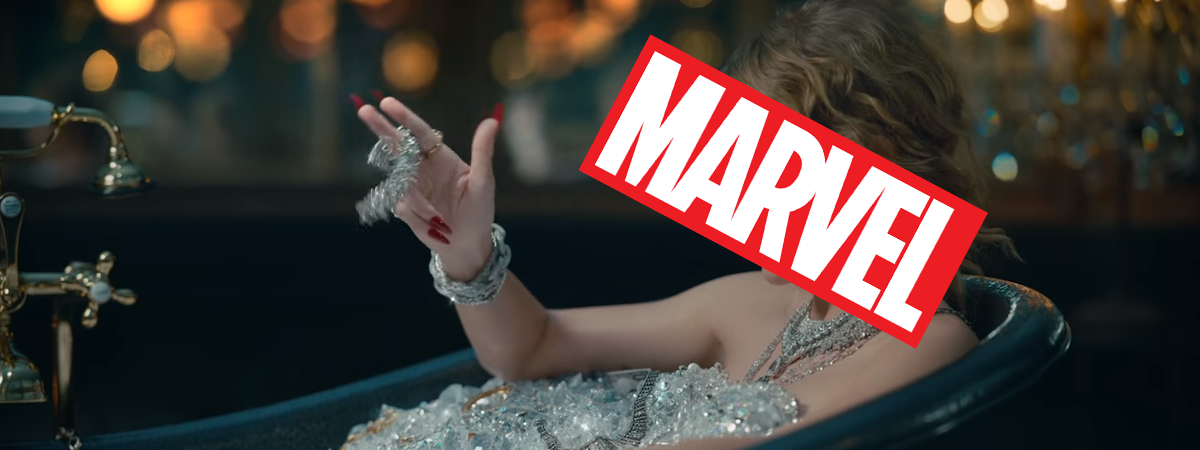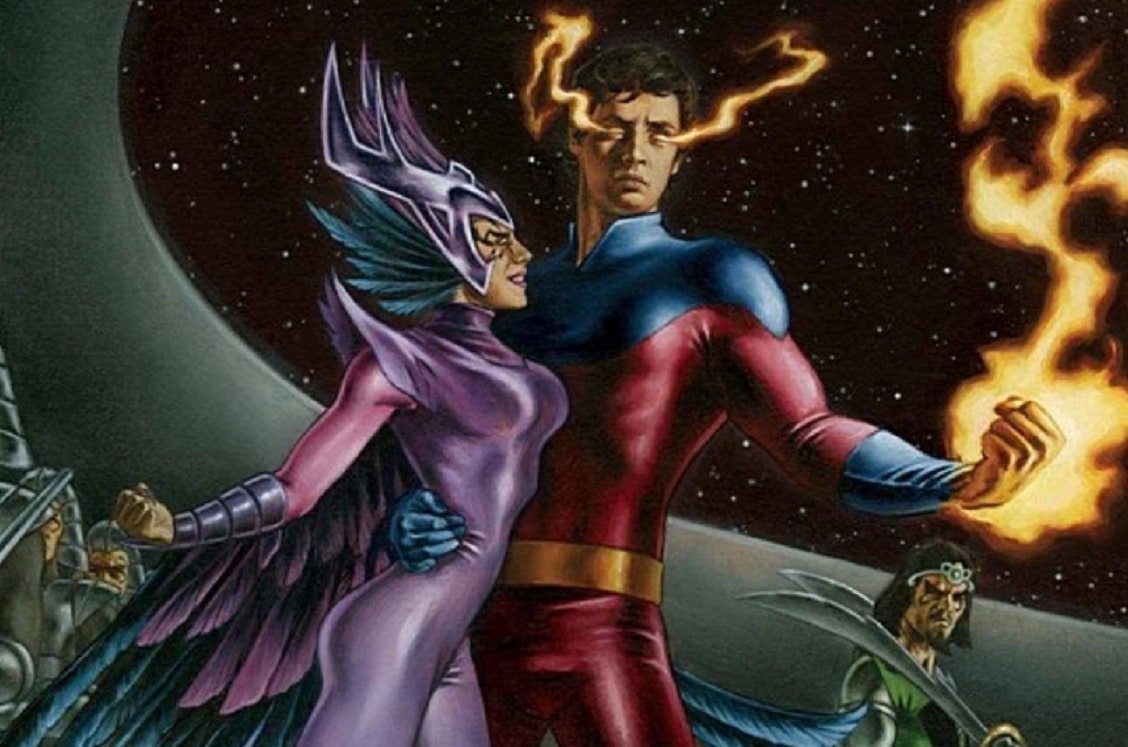by Eli Cross
If you have any doubts as to what C.B. Cebulski plans on doing as Marvel’s new Editor-in-Chief, the header text on the official announcement of his promotion should put those thoughts to rest:
As Editor-in-Chief, Cebulski will be one of the paramount figureheads for those following the business side of Marvel Comics’ editorial process. Thus, the way his appointment is branded and indeed, his appointment itself, gives us big hints as to where Marvel believes they can make fiscal headway in the years to come. And from the above it’s clear that Marvel thinks the money lies outside of traditional comics channels.

The House of Ideas has good reason to think that, as over the last few years, their comics division has struggled to make headway in the U.S. direct market channel. Following several years of poorly received relaunches and event comics as well as a variety of PR disasters, the company’s public perception and sales numbers are in desperate need of a boost.
If one were to reductively sum up the reasoning behind Marvel’s woes, one might argue that Marvel’s yearly renumberings/relaunches, designed to game sales numbers by creating new #1s for speculators to buy in droves, and promotional tactics such as lenticulars, appeal to an increasingly small number of their older and more enfranchised readers. Conversely, one could also say that Marvel’s understanding of their newer, younger readership is shaky at best. It’s not nearly a perfect analysis of the situation, but no matter how you look at it, it’s become clear that Marvel’s current domestic strategy isn’t working. Something has to change. Perhaps that means changing the content itself. Or perhaps it means creating content for an entirely different audience.
Back in 2015, Marvel announced that they planned to begin developing comics specifically for Asian marketplaces. Soon after this, Cebulski was promoted to Vice President for international business and brand management in Marvel Asia. He left New York for Shanghai, China, with the self-stated goal of “reverse engineering” the Marvel brand for foreign markets.
The basic idea was this: Marvel’s films are successful worldwide. However, as Cebulski said, “the movies hit and there’s a period where there are T-shirts and toys everywhere. After a while, it returns to a lull.” So if we follow this logic, the lull exists because there isn’t a constant influx of Marvel content in Asia to keep interest high and coffers full. There’s a movie, then nothing for three to six months. You can’t fill the void with U.S. content because for a variety of reasons, including what Cebulski describes as a fundamental difference in “storytelling structure,” it won’t sell. So you create new, original content catered to those markets instead.
Before today’s announcement, that ethos began to bear concrete fruit. At San Diego Comic Con this year, Marvel announced two comics series by all-Asian teams that would be released in Asia first before being imported to territories such as the US. Those titles include Sword Master, drawn by Chen Xioyun and written by Xi Shanshan, as well as Aero, drawn by Xu Ming and written by Zhou Jiajun. At the time, those titles didn’t receive much coverage from the US media, but in retrospect, they’re the first examples of a new approach to the way Marvel is tackling the comics marketplace– they may be struggling here in the States, but there are billions more potential audience members around the world.
Sword Master and Aero are new Chinese characters in the Marvel universe. #MarvelCupOJoeSDCC pic.twitter.com/dRZBpvKrgk
— Marvel LIVE! Updates (@marvellive) July 22, 2017
On a macro level, Cebulski has already made major headway in establishing a presence for Marvel comics in the way that many major domestic film studios have teamed up with Asian ones in search of global profits. Notice how much of the official press release is dedicated to listing Cebulski’s accomplishments abroad:
Over the past 6 years, Mr. Cebulski has been at the forefront of Marvel Entertainment’s global expansion, as both VP, International Development Brand Management and most recently VP, Marvel Brand Management and Development, Asia. In these roles, he has been instrumental in exploring new opportunities for Marvel in both emerging and established markets. Mr. Cebulski also paved the way for the further globalization of the Marvel Universe — overseeing groundbreaking deals with manga publisher Kodansha in Japan, webcomics platform Daum in Korea and content creator NetEase in China, bringing Marvel to Asian markets through localized stories and characters. He has also helped introduce fresh new creative styles to the company’s world-renowned Super Hero franchises across comics, animation and games through the recruitment and development of numerous international artists and writers.
Additionally, Mr. Cebulski will be tasked with bringing his global perspective to his new role. He will be working closely with comics partners like Panini, NetEase, Daum and Kodansha to expand the everyday Marvel Comics experience for fans across the world.
“Spending these last 18 months in Asia, and introducing more fans here to the depth of the Marvel Universe, I’ve seen firsthand how our comics and characters constantly bring joy into people’s lives all over the world. I hope to continue capturing that creative magic here at home, and deliver inspirational and entertaining stories that are true to the classic Marvel DNA, but built with an expanding global mindset.”
And then, on a micro level, Cebulski has developed a well-earned reputation as a peerless talent scout. Many have credited him for spearheading the now seminal Runaways series, featuring luminaries Brian K Vaughan and Adrian Alphona. And if you look, it’s evident that Cebulski has spent much of his time abroad making inroads with local talent.
As recently as this week, he gave an interview to the Philippine Star. The column shows Cebulski providing advice to aspiring Filipino comics artists, but also gives us insight into what may well be his guiding mantra as the new Editor-in-Chief:
“You know, Marvel has always reflected the real world,” notes C.B. “Stan Lee always said that Marvel is the world outside your window. We were the first in so many cases to reflect the political situation, be it the Vietnam War, the Afghanistan War, even 9/11, the way the heroes in our comics reacted to those terrible events. And we continue to do that, as we expand globally and bring different countries and cultures into the comics, because we want to accurately reflect those cultures as well.”
That being said, the first responsibility is to entertain fans.
“We have to remember that we are escapism as well. People go into the movies and read the comics to forget about what they’re seeing on the news sometimes. So that’s the fine line we’re always going to walk: we have to reflect what’s going on in the world, but sometimes it’s best if Marvel heroes don’t get too political or reflect the opinions or views of the people that are making them. We’re always striving to find that balance.”
We see Cebulski cringing away from the incendiary nature of stories like Secret Empire, which touch upon divisive current events in a way that many consider inappropriate and inconsiderate. Additionally, we see Cebulski wanting Marvel stories to stay current, and more importantly, accurately representative of the world at large.
While this likely means we’re going to get more diverse creative voices in Marvel’s US publishing slate, given the strategy Marvel has developed at creating region-oriented content, we’re also likely to see a more strategically fractured lineup that varies depending on the region.
Not only that, but we’re likely to see Marvel move away from the direct market in favor of other platforms and markets. Marvel has already tested the waters of the book market with content like an original Squirrel Girl graphic novel. The company also has its own “Infinite Comics” digital platform. That said, these projects, by and large, were at the margins of Marvel’s US financial strategy. On the other hand, while abroad, Cebulski has made inroads with international webcomics platforms and other new media companies. By putting Cebulski in charge, Marvel may be signaling that they plan to explore alternative distribution models in the US in earnest.
As the official PR mentions, “over the past five years, comics and collections sales have grown over 30% in the direct market and 60% in the book market.” Sixty versus thirty. It’s clear where the biggest growth is. Thus, it’s also clear where the biggest potential audience is. The past is past and the future for the market is becoming increasingly clear.
Of course, the actual publishing format and distribution channels are not solely the choice of the EiC. The Publisher and Marketing department also have voices in those decisions, although it’s anyone’s guess which voice is the dominant one today.
Like Axel, Cebulski came out of the Jemas/Quesada “Nu Marvel” era. Cebulski is younger than Axel and was a more minor figure at the time, but Marvel is going back to that same management core as the sun sets on Axel’s nearly 8 year reign.










“The past is past and the future for the market is becoming increasingly clear.”
Which is the exact same thing said when people were hyping up the OGN and trade paperback as the “future” of the industry…only to see the poor old pamphlet still paying the bills all these years later.
Mike
“Or perhaps it means creating content for an entirely different audience.”
Um, they have been trying to do this (sure still w/ superheroes (and nothing wrong with that!), but geared towards a younger and minority customer base) and it’s alienated the majority of their core customers (i.e. the ones that spend the most money week and week out).
“Not only that, but we’re likely to see Marvel move away from the direct market in favor of other platforms and markets. ”
Marvel only have themselves to blame for their losing sales in the Direct Market and they totally didn’t have to. I’ve never before seen a company give the middle finger to a dedicated core base of customers before, but Marvel continually does it in search of some mythical alternative customer/market.
After years and years now of the heroes treating each other like dirt, beating each other up, the constant backstabbing and villainy that make the super villains look good I’m not sure I’d care to even look at marvel anymore, no matter who is in charge. Not at a 4.99 price per book and I can’t afford a tablet. This guy’ll be publishing for other people. If I were a comic shop owner and I was hearing about all the alternative platforms marvel plans on developing I’d be worried.
Any official word on when Tony Stark is taking over from Riri Williams as Iron Man?
What I find surprising about this is traditionally at Marvel, an Editor becomes Editor in Chief. EG somebody like Tom Brevoort. I’m not saying CB is a bad choice, just that it’s a very different career trajectory to that position.
So now American comic books will be crafted for the Asian market, just like American movies have been crafted for that market for the last decade. Because Asia is the only market that matters. And the shrinking number of Americans still reading comic books will just have to accept Asian tastes and attitudes.
“but sometimes it’s best if Marvel heroes don’t get too political or reflect the opinions or views of the people that are making them.”
No, can’t have any criticism of the Chinese government in Marvel comics. Might alienate the only customer base that still matters. And references to American politics might puzzle them. So the comics will take place in a vacuum.
Jess hagopian, Riri isn’t Iron Man, she’s Ironheart. And once Tony’s back in action, they’ll exist together. You’ll notice both of their heads are on the corner box.
Just make good comics! That is all that matters. Make something that you would pay $3,99 for yourselves. The rest will follow, if you keep at it.
Great expose’, Heidi. Very illuminating.
@getlostmarvel I think the books you mention do pretty well in collected trades due to Scholastic. They do pretty well there, or so I have heard. They are listening to the most vocal portion of the population, not the most populated one.
I hope that Cebulski does bring about a more positive change. Heck, I hope they drop the price of the comic books. That would make a big difference.
I have been reading comic books for a very, very, very long time. They will continue to put out books that I like and ones that I could care less about. It has always been like that. You shouldn’t want to read everything a comic book company puts out. Just read what makes you happy.
Finally, there are a lot of straight, white characters out there in comic book land. You do know this is true, right? I’m not going to list them.
@getlostmarvel – perhaps the lack of marketing and over reliance on diversity as a sole selling point hamstrung those books.
Marvel’s weak performance is due to not widening its core content’s appeal by making it better.
Good-bye Axel Alonso. You won’t be missed. Ditto for Bendis. Now we just need Quesada, Brevoort, Buckley, Gabriel and Perlmutter gone, and take Loeb with them.
@Douglas A Walker: “I think the books you mention do pretty well in collected trades due to Scholastic.”
Prove it.
When books fail the first go to excuse for Marvel Zombies is always “this does well in a market who sales figures no one can see.”
What you actually mean is “I am desperate for this book I’m not reading, but whose existence backs my pre–existing political belief system to do well fiscally, but since it’s not I’m going to claim it is doing well in a market no one can fact check me on & hope no one notices what I did.”.
James,
I think you mean to say that Riri will make occasional guest appearances in Tony’s, and others, books once or twice a year.
Sales on her solo title really don’t justify having her take on a co-starring role in “Iron Man” after Tony returns.
After reading Eli’s article, and his justification that Cebulski is taking over because he’s made in-roads in the Chinese market, reminds me a lot of when Bob Harras became EiC simply because his X-Men titles were the top sellers at the time.
Another reactionary move from Marvel.
Marvel has been dropping because of a lack of recognizable characters. Their lineup just isn’t great. Stop replacing Thor, Cap, Iron Man, Spidey, etc with different characters and people will buy. I love Ms. Marvel, and that’s what Marvel should do with Miles and Jane Foster – distinct identities.
You mean like Thunderstrike (formerly Thor)?
And USAgent (formerly Captain America)?
And War Machine (formerly Iron Man)?
:)
@Thaddius it’s ‘Waltz’ not ‘Walker’. I don’t use comic books as an influence on my pre-existing political belief systems. Especially ones I don’t read. I read comic books for enjoyment, you know like you’re supposed to. They’re entertainment. No more, no less, to me anyway. And I did say “I think’ not ‘I know’. I do not have proof, it’s just something I heard. Could be wrong, could be right. No idea.
So, what I mean is pretty off base from what you’ve got there, pardner.
If we’ve learned nothing from diversity it’s that people like to read about what they are. Confirmation bias is huge apparently.
If Marvel were smart, they’d take their catalog and begin to give everyone what they want…how they want it. Give the DM the OG heroes, do Next Gen stuff for library deals and finally revisit the Marvel UK thing and spin-off titles for foreign markets.
There’s no reason Marvel needs to engage in the class war speculator game or the divisive Trumpian bullshit of pitting one people group against another…they’ve got enough for everybody.
I won’t pay $4 for a 22pg comic tho, so more for everybody else. #agedoutpricedout
It will no doubt be argued over the weeks and months to come, but I really believe that Marvel started to lose the fans with the ongoing cancellations and restarts, the so-called seasonal approach. Readers would just get into a new title only to find out that it was going to be relaunched as All New Marvel X or Marvel X Now, etc. There was little stability and the relaunches were just tying to profit from improved sales of the first issue. This was a clear gimmick but just took some time to catch up with Marvel.
The other thing that was a big problem, and I’m blaming Bendis for some of this, was the extreme decompression of some of the story lines and many stories being written not just for the TPB but for the Omnibus. At $4 each, it’s a waste of panels to have an entire splash page devoted to a city landscape that adds nothing to the story or character. I’ve read many comics with these kinds of mundane establishing shots and with characters spouting off dialogue that does nothing to advance the story or the reader’s understanding of the characters themselves.
I don’t know that stressing diversity led to a large drop in sales but do know that the comics weren’t written for new readers – they are too expensive with too little bang for the buck – so don’t believe that stressing more diverse characters led to improved sales. I don’t think the new EIC needs to reverse some of the diversity outreach that Marvel has been engaged in but do believe that he needs to help ensure that comic series aren’t constantly cancelled and restarted and also they need to be mindful of the fact that comics are expensive and try to include more story in each issue.
Comments are closed.